The following query pulls data correctly as expected, however the left join with lnk_cat_isrc table and through that to catalogue table, brings back repeated data if there is more than one item in catalogue which has the same isrcs from isrc table:
SELECT
isrc.ISRC,
isrc.Track_Name,
isrc.ArtistName,
isrc.TitleVersion,
isrc.Track_Time,
`isrc_performer`.`PerformerName` ,
`performer_category`.`PerformerCategory` ,
`isrc_performer`.`PerformerRole` ,
`isrc`.`isrc_ID`,
`isrc_performer`.`Perf_ID`
FROM `isrc`
LEFT JOIN `isrc_performer` ON (isrc.isrc_ID = isrc_performer.isrc_ID)
LEFT JOIN `performer_category` ON (performer_category.PerfCat_ID = isrc_performer.PerfCat_ID)
LEFT JOIN `lnk_cat_isrc` ON (lnk_cat_isrc.isrc_ID = isrc.isrc_ID)
LEFT JOIN `catalogue` ON (catalogue.ID = lnk_cat_isrc.cat_id)
ORDER BY isrc_ID desc LIMIT 0 , 10
";
I cannot use group by on isrc, because the isrc_performer table can have more than one performer to an isrc.
So the relations are like this:
Few items from catalogue table can have several identical items from isrc table. In turn, each isrc can have more than one entry in isrc_performer table.
What I want is to display all corresponding data from isrc_performer in relation to each isrc, but not repeating it for each item from catalogue table.
I also want to display all the rest "empty" isrcs (those which don't have any data in isrc_performer table)
Can you give me any ideas?
P.S. despite I'm not pulling any data from catalogue table itself, I'm using it to search by a catalogue number, when user defines search criteria for $where_condition variable, hence I need to keep it in the query.
i.e. $where_condition = "catalogue.Catalogue LIKE '%test%' OR ISRC LIKE '%test%' OR Track_Name LIKE '%test%' OR ArtistName LIKE '%test%' OR TitleVersion LIKE '%test%' OR PerformerName LIKE '%test%' OR PerformerCategory LIKE '%test%' OR PerformerRole LIKE '%test%'";
------UPD:
trying to graphically represent possible variation in these 3 tables relations:
cat1 - isrc1 - performer1
isrc2 - performer1
- performer2
- performer3
cat2 - isrc2 - performer1
- performer2
- performer3
- isrc3 - performer2
- performer4
cat3 - isrc4
- isrc1 - performer1
UPD (pics added)
Here are screen prints. As you can see on picture 1 there are 9 rows with same isrc number, however there are 3 repeated performers Jason, David, Paul.
This is because 3 different catalogue items have this exact isrc with 3 different performers as per pic 2
= 1(isrc) * 3(catalogue) * 3(performers) = 9 row on output
All I want is that Performers grid would only display 3 rows of this isrc for each performer.

